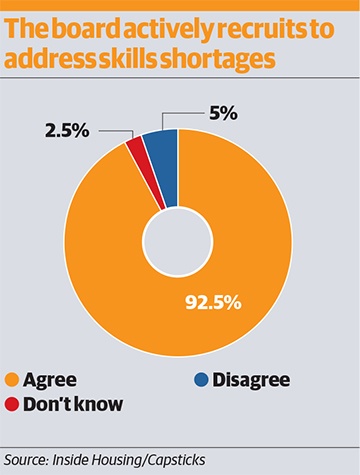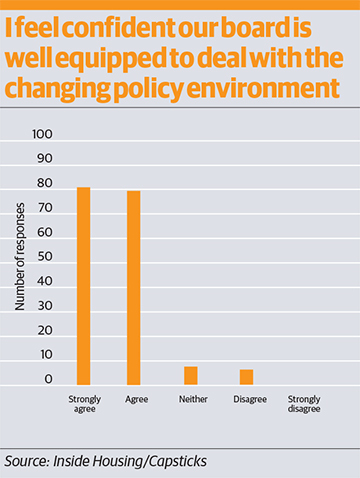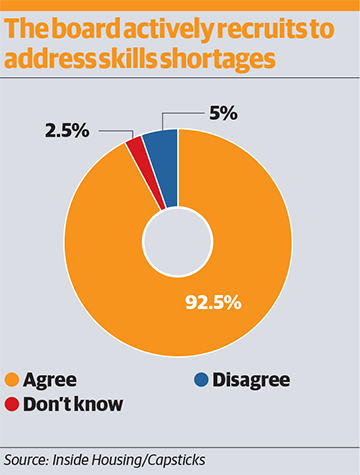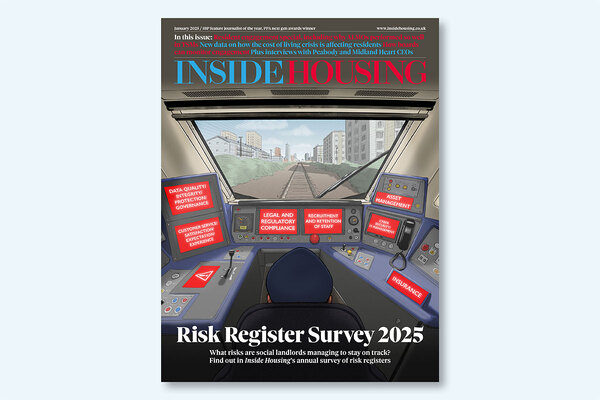Board survey
Are boards confident in their skills and training? Inside Housing and Capsticks carried out a survey of housing association board members to find out

In association with:

Housing associations are going through the most significant change to their operating environment for decades.
To determine if their boards are well positioned to respond and adapt, Inside Housing and social housing law firm Capsticks launched a detailed survey of non-executive board members to explore their experiences, perceptions and attitudes. We asked respondents to take a long, hard look at themselves and share their reflections on how their own boards measure up on everything from skills to board development.
So what was revealed?
Confident outlook
At first glance, the survey shows that board members like what they see in the mirror. A whopping 93% of 202 participants felt that their board already had the skills to effectively manage major incoming policies, including Right to Buy and the 1% annual rent cut.
Ian Kitson, board member at 4,300-home Yorkshire Coast Homes, is indicative of this view. “I’ve been on the board effectively since the beginning of 2015 and throughout the board meetings that I’ve been to, nothing has given me any concern for our association - everything is rock solid,” he says.
But is this a case of justifiably high self-esteem, or over-confidence?

Gary Hay, partner at Capsticks, is cautious. “Every single association we talk to says [this is] what they’re bogged down with - the financial climate and the changes that have come in,” he notes.
“In my experience, board members are saying they don’t feel properly equipped to deal with that.”
Andrew Frayling, chair of 8,800-home Merlin, believes that boards are not getting enough external scrutiny to really know. “My biggest moan is the fact that the regulator just doesn’t know what housing associations are up to,” he says. “For example, how can they hand out a V1 [the highest rating on viability] to an organisation where the board meets just four times a year?”
Still, there are indications that boards aren’t being complacent on the issue of skills and effectiveness. Four in five boards are actively recruiting to address skills shortages. And, when asked which skills their board needs more of, commercial nous topped the list. More than a quarter of board members cite the need for additional commercial skills. Investment knowledge is also in demand, as 22% of respondents highlighted that additional expertise in this area would aid their governance.
However, a full 22% of board members opted to not list any additional area of skill that they thought their board could benefit from. Abigail Davies, vice chair of 3,500-home housing association Trident, says she’s “confident” that her board’s ongoing recruitment policy means that there are no obvious weaknesses in its skills composition.
A vast majority of housing associations are also investing in skilling up their boards. A full 84% of board members have access to training and development programmes. In addition, 93% of board members have been given opportunities to get to grips with their tenants’ needs, which is especially important given the need to ensure that the association is fulfilling its duties to residents.
Meanwhile, the average tenure of board members is dropping, giving a possible indication that boards are refreshing the skills and make-up of their members. Forty-four per cent of survey respondents have sat on an association board for less than three years. This is likely in part as a result of the ‘nine-year rule’ being incorporated into many housing associations’ code of governance, capping the time that members can sit on boards.
Fresh blood
Survey respondents were overwhelmingly in favour of fixed board terms, with 83% saying that they supported their implementation. However, there is still opposition to the idea, including from Mr Kitson of Yorkshire Coast Homes. He says that although he understands why fixed terms were introduced, he does not agree with the policy because it results in talent being forced out of associations.

“I think if they’re good enough for the job and if they’re doing a good job, they should be able to stay in that job,” he says. “We have lost four talented board members with a lot of skills that are useful to the board and to the company as a whole. You then have to bring someone in who has commensurate skills and it can be hard for people to come in and fill that void.”
Despite this increase in turnover, the profile of housing association board members remains predominantly male and older, echoing what Inside Housing revealed in its audit of diversity in leadership roles (12 February 2016). Men made up 65% of respondents, and as for age, the survey showed just 17% of board members are 18-45 years old, while those in the 46-75 age bracket accounted for a massive 81% of respondents.
Meanwhile, an appropriate level of representation for tenants on boards is becoming an increasingly controversial subject. Only 62% of board members said that their organisation specifically encourages applications from its client group. One survey participant even went so far to say that they felt it was “very difficult” for the average resident to be effective on a board, as the knowledge, language and responsibilities often operate at a very high level.
Ms Davies from Trident disagrees with this view, and warns that reducing the number of reserved tenant places on boards puts their voices in danger of being ignored. “The recent rent cuts caught many associations on the hoof and have led to a shift in priorities, with a commercialisation agenda coming to the fore ahead of tenant needs,” she says.
Housing associations may be looking to other ways to engage with tenants, instead of recruiting board members, points out Mr Hay from Capsticks.
“There is a lot of discussion around creating a proper engagement programme with staff and tenants,” Mr Hay says. “They’re all saying that in the current climate engagement through IT is essential. If you haven’t got proper tenant-staff engagement, you will be a less effective organisation and it does adversely affect the bottom line.”
With external pressure continuing to be exerted on housing associations, governance will no doubt only become more challenging. But on the basis of these survey results, many boards do believe they are well equipped for whatever the future may bring.











